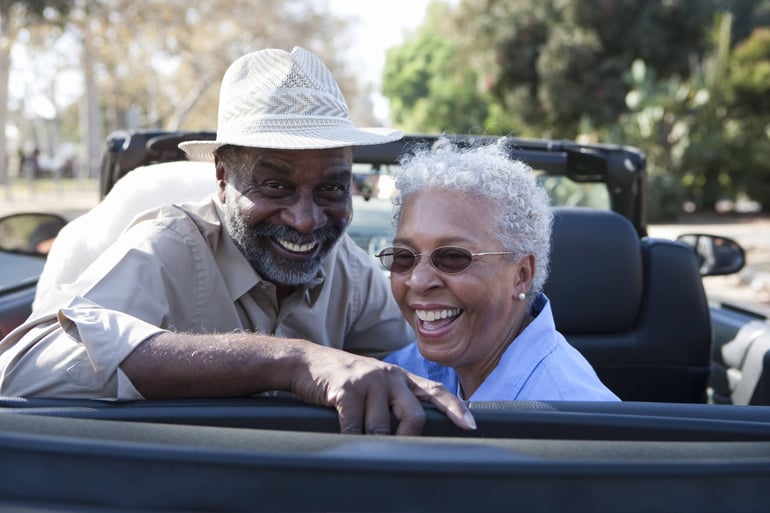 Summer is here, and many older Americans are hitting the road after spending sheltering in place for most of 2020 due to the COVID-19 pandemic. The good news? The vast majority of seniors in the U.S. are now fully vaccinated. However, there’s still a way to go until the rest of the country catches up. For now, health experts emphasize that it’s still important to take precautions when traveling.
Summer is here, and many older Americans are hitting the road after spending sheltering in place for most of 2020 due to the COVID-19 pandemic. The good news? The vast majority of seniors in the U.S. are now fully vaccinated. However, there’s still a way to go until the rest of the country catches up. For now, health experts emphasize that it’s still important to take precautions when traveling.
Here are a few travel tips for seniors to keep you safe while making adventurous, purposeful living a priority.
1. Get Flexible
Not exactly the go-with-the-flow type? That’s understandable, especially if you enjoy researching and arranging trips well in advance of your travel date. But in the age of COVID-19, local regulations and advisories are ever-shifting. What might be considered a non-restrictive, low-risk destination one month could potentially close its borders the next.
Yet all of this uncertainty can also have its benefits. For example, you might have reluctantly ruled out an area earlier in the year, only to find out that travel advisories have now been lifted. Or some initially frustrating restrictions on your preferred destination might nudge you to a magical area you never knew existed.
2. Know Before You Go
Along with double-checking any travel advisories due to COVID-19, other illnesses, and even weather advisories, you’ll want to find out what is required of you regarding immunizations and testing requirements.
In addition to getting testing and immunization records updated, it’s important to ask if you will need to quarantine once you get there. If you only have a short amount of time to travel, a quarantine is obviously a no-go for most travelers. On the other hand, if it’s just the kickoff of your journey, a luxurious weekend at a hotel might not sound so bad!
3. Stay Cautious
Even when you’re fully vaccinated and staying in an area with low case numbers, remember to be sensible. Depending on where you live, mask-wearing might be something of a personal decision in your day-to-day life, but be aware that bus stations, train stations, airports, and other travel hubs almost always require masks.
And because even vaccinated people increase their risk of getting COVID-19 simply by traveling, it’s wise to wear them indoors even if the establishment doesn’t require them. Consider outdoor dining whenever possible, and practice social distancing when it’s not. Finally, continue hand washing as frequently and thoroughly as possible.
4. Keep Young Ones Safe
Unfortunately, you may need to wait to take your younger grandkids on a special trip, depending on your destination. Until vaccinations are available for all ages, kids run the risk of catching and spreading the virus.
For now, make the trip adults-only, or consider a family-style “staycation” with as much outdoor activity as possible. RV rentals or remote cabins are a great way to make memories without risking anyone’s health.
5. Factor in “Re-entry”
Domestic vacations are a better bet for the time being than traveling outside the U.S. That's because international travel is, unfortunately, still fraught with complications. Although vaccinations protect you from serious illness, your status often won’t shield you from the requirements involved in going to, and returning from, the U.S.
If you absolutely must travel outside of the country, make sure you factor in the time it will take to arrange for a COVID-19 test if your host country requires it upon arrival or departure.
When you get home from any extended trip, make sure to monitor yourself for symptoms. If you’ve been vacationing in the states, you don’t necessarily need a test. But make sure to pay special attention to potential symptoms.
And Don’t Forget These 5 Additional Travel Tips for Seniors!
- Consider keeping your trips within a geographic location you can comfortably drive yourself in order to avoid crowded travel hubs.
- Pack plenty of tissues, sanitizing wipes, over-the-counter medications, and, of course, your prescriptions. This will minimize the need to visit urgent care clinics for minor illnesses — but you shouldn’t hesitate to seek professional treatment for symptoms that concern you.
- If you need to travel on a plane, bus, or train, take plenty of hand sanitizer. The Transportation Security Administration currently allows up to 12 ounces of hand sanitizer on flights.
- When going through security checkpoints, put your wallets, keys, and other “pocket items” in a purse or carry-on rather than bins so that they can be X-rayed rather than handled by security.
- Book hotels, cars, or rental homes that emphasize sanitized cleaning and social distancing on their websites. Some even provide “contactless” check-in and departures.
Speaking of re-entry, if you find that broadening your mind through travel has also made you reconsider your daily living arrangements, click here to download our free guide and learn more about how to choose a retirement community.
Now more than ever, it’s important to ensure that your neighborhood meets your needs, including keeping your health and safety as paramount concerns.
Our How to Choose a Retirement Community Guide helps you prioritize other concerns as well, including independent living, proximity to family, enriching and enjoyable events and activities, and the type of community in which you feel most at home.












